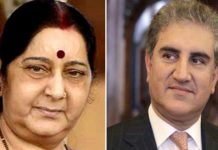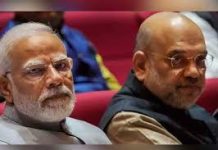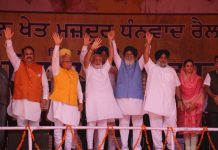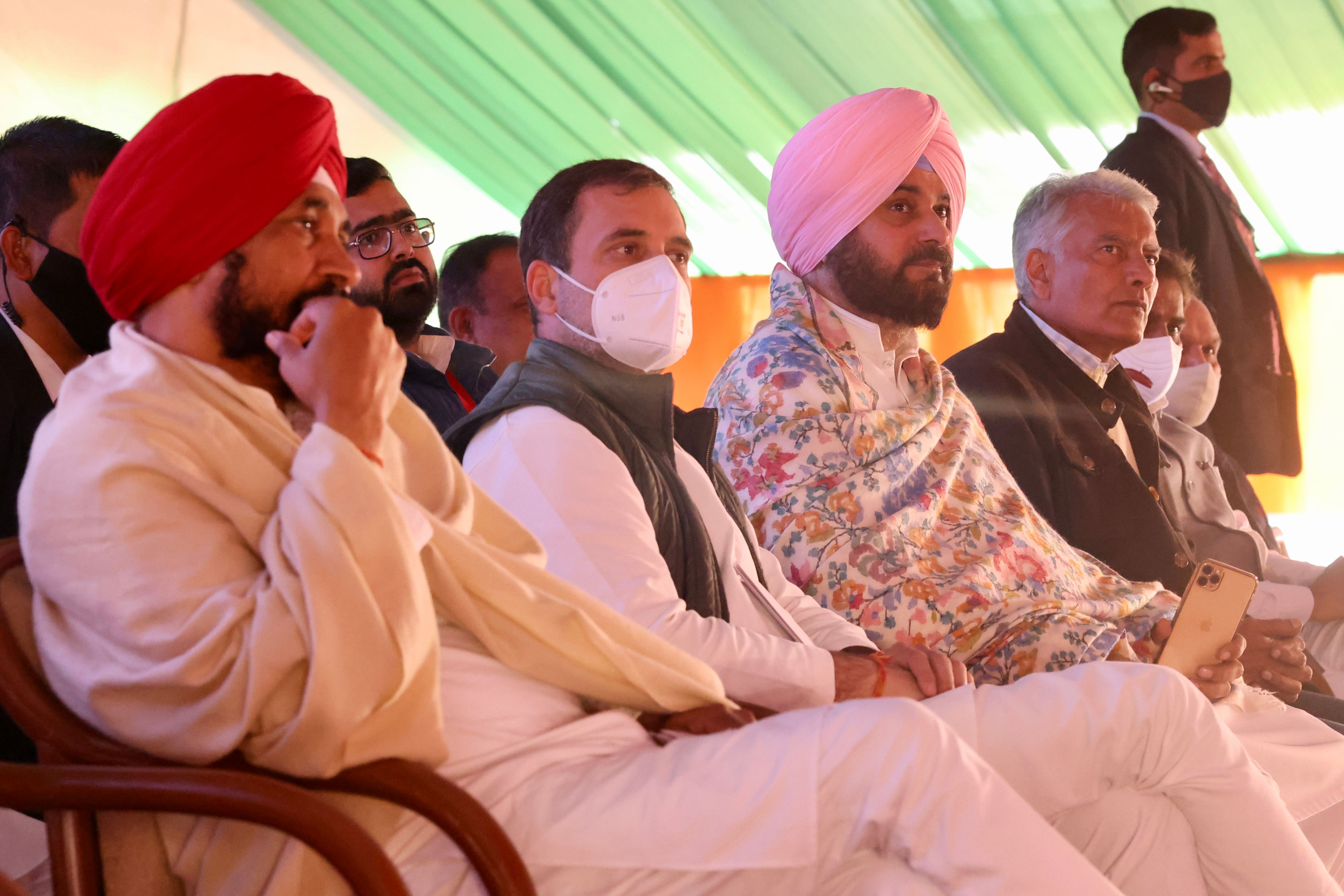
Congress had set a store by Assembly polls, dubbed as a semi-final ahead of 2024 national polls. it hoped for an encore in Punjab, a comeback in Uttarakhand, Goa and Manipur and an improved tally in UP. But the results dashed all its hopes, writes Amit Agnihotri
After the Congress suffered a major setback in the five assembly polls in Punjab, Uttarakhand, Goa, Manipur and Uttar Pradesh, the high command said it will learn from the outcome even as concerns were raised over the grand old party’s future.
The state polls were crucial for the Congress and were dubbed as a semi-final ahead of the 2024 national elections, when the grand old party hopes to dislodge the BJP.
Out of the five states, the Congress was hopeful of retaining power in Punjab, staging a comeback in Uttarakhand, Goa and Manipur and looked forward to improving its tally in UP.
However, the results shocked the party’s rank and file as well as former chief Rahul Gandhi and UP in charge Priyanka Gandhi Vadra, who had led the campaign in five states.
The Congress lost power in Punjab to the Aam Aadmi Party and failed to defeat the BJP in Uttarakhand, Goa, Manipur. In Uttar Pradesh, the party could not even retain the seven seats it had won in 2017.
Party chief Sonia Gandhi convened a meeting of the Congress Working Committee to review the poll losses in five states, which means the Congress will have to struggle for five more years besides revamping the organization nationally.
Since 2020, both Rahul and Priyanka have been calling the shots in the Congress. Taking a dig at them former Congress leader Ashwani Kumar, who left the party ahead of the state polls, termed the two as “entitled” leaders.
Veteran Ghulam Nabi Azad, who led the group of 23 dissenters last year, said it was painful to watch the grand old party die like this.
On his part, Rahul, a former Congress chief, accepted the poll defeat with humility.
“Humbly accept the people’s verdict. Best wishes to those who have won the mandate. My gratitude to all Congress workers and volunteers for their hard work and dedication. We will learn from this and keep working for the interests of the people of India,” Rahul tweeted.
Priyanka said the Congress could not convert public opinion into seats but will continue to raise people’s issues.
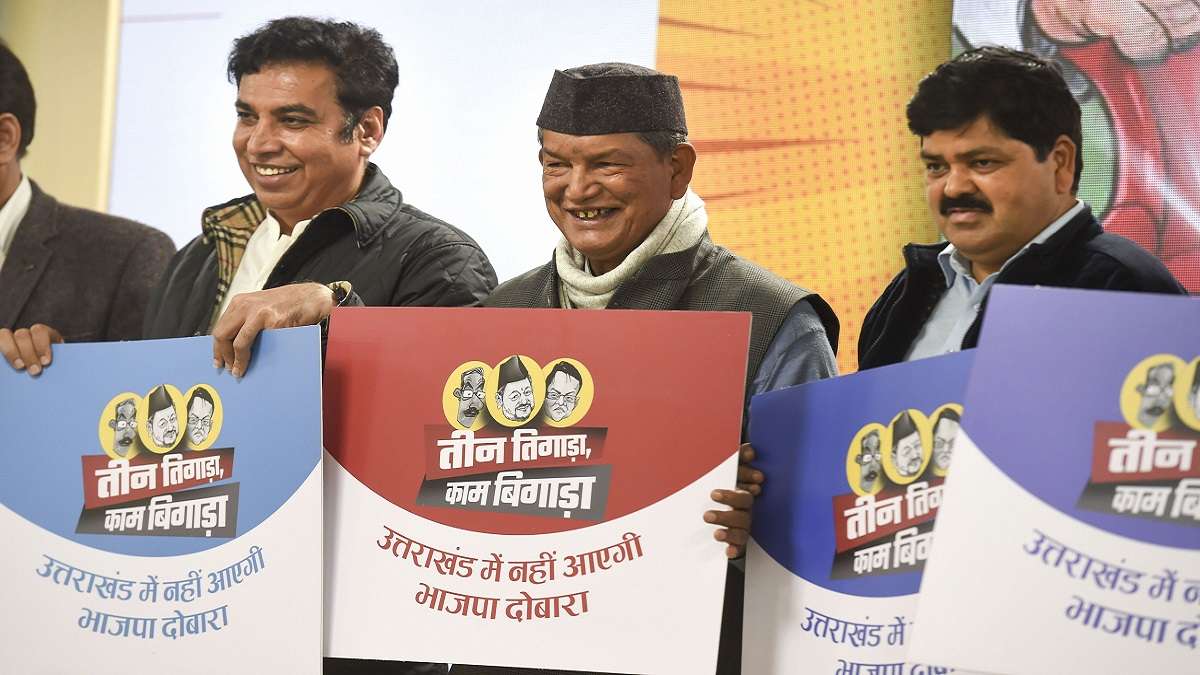
Chief spokesperson Randeep Surjewala claimed the party will reinvent and return with a new strategy.
“We will introspect on the causes of defeat, work on the organisation and will try to do better in future. We are definitely disappointed but not demoralised. We have only lost the election, not courage. We are not going anywhere – we will keep fighting until we win. We will reinvent and return and will come back with a new strategy,” he said.
“The election results of five states have come against the party’s expectations. We were expecting good results in Uttarakhand, Goa and Punjab, but we accept that we failed to get the people’s blessings,” he said, adding, “This is a lesson that we need to work harder on the ground.”
“We made every effort to keep this election away from the issues of casteism and religious polarisation. But with the help of BJP’s massive campaign, emotional issues dominated the issues of education, health, inflation, unemployment,” he said.
UP: Priyanka’s spirited campaign fails to bear fruit
The Congress had been on the margins in UP since the 1990s. It lost its Dalit and Muslim vote banks to BSP and SP respectively. The party won 23 Lok Sabha seats out of 80 in 2009 but could get just 2 Lok Sabha seats in 2014 (Sonia Gandhi from Rae Bareli and Rahul Gandhi from Amethi) but came down to 1 (Sonia in Rae Bareli) in 2019.
Priyanka got charge of half of the state along with former party leader Jyotiraditya Scindia in 2019 but was given full charge after the polls. Over the past two years, she led several campaigns against the BJP government over women’s rights, social justice, jobs, farmers’ plight and jobs for the youth.
There were concerns that she only used to visit the state during political movements and lacked a base in Lucknow.
Under Priyanka, the Congress campaign in UP had focused on empowering the women, who comprises half of the voters, with a strong focus on reforming the education sector, providing jobs for the youth and reviving the small and medium industries.
She mobilized the women voters through the “Ladki hun lad sakti hun campaign” and launched separate manifestoes for the women and youth.
On March 8, two days before the poll results, she staged an impressive march of all the party’s women candidates in Lucknow to make a point.
In 2017, the Congress fought the assembly elections with the SP but the alliance did not work. The SP got 47 seats and Congress 7. In 2022, the party’s tally dropped to just 2 and the vote share came down from 6 to 2.3 percent.
Having realized that the coming days were full of struggle, Priyanka had stated before the results that she will not leave the state till the new style of politics introduced by her took root. It would be interesting to watch her next moves.
Punjab: Infighting costs party dear
In 2017, the Congress had swept the state by winning 77 out of the total 117 assembly seats and installed then state unit chief Amarinder Singh as chief minister.
The AAP, which had contested the state polls for the first time in 2017, won 20 seats and became the main opposition.
This time, the Congress came down to 18 while AAP swept the polls with 92 seats.
SAD won 4 seats while BJP won 2 seats.
The Punjab Congress suffered from severe infighting which surfaced last year and led to a majority of the MLAs demanding that then chief minister Amarinder Singh be changed ahead of the 2022 polls.
In an attempt to curb dissidence, the high command installed party MLA Navjot Singh Sidhu as the new state unit chief much against the wishes of Amarinder.
The peace formula did not work and forced the high command to replace Amarinder Singh with a Dalit Sikh Charanjit Singh Channi as chief minister, who got just a few months to prove himself.

While Priyanka Gandhi Vadra had been instrumental in installing Sidhu as state unit chief, Channi’s appointment was dubbed as a masterstroke from Rahul and was supposed to give a new direction to Dalit politics in the country.
Unfortunately, Channi and Sidhu too could not work as a team and their differences often became public, causing the party to lose in the elections.
Channi, Sidhu and Amarinder lost the polls.
Interestingly, party’s chief spokesperson Surjewala blamed the anti-incumbency of four and a half years of the Amarinder Singh government for the result and said people voted for a change.
Uttrakhand: Chance went a begging
The Congress had a good chance of winning Uttarakhand as the state BJP had been in a disarray and was forced to change three chief ministers over the past five years.
Chief Minister Pushkar Singh Dhami took over office in July last year. Before that, the saffron party had replaced then chief minister Trivendra Singh Rawat in March with Tirath Singh Rawat.
Yet, the BJP was able to beat anti-incumbency and win 48/70 seats while the Congress got 18 seats, up from 11 in 2017. Former chief minister Harish Rawat, the biggest face of Congress in the state, lost the polls from Lalkuan.
Earlier, he had expressed displeasure over lack of support from the organization and there was a confusion over the seat from where he would contest. The Congress also lost former state unit chief Kishore Upadhyay to the BJP due to infighting.
Rahul Gandhi had restructured the Uttarakhand unit last year bringing in Rawat’s nominee Ganesh Godiyal as the new state unit chief but the new team failed to deliver.
AAP could not win even a single seat while the BSP got 2 seats. AAP had fielded mountaineer and former Army officer Colonel Ajay Kothiyal as its chief ministerial candidate and promised free electricity, jobs and pilgrimage if voted to power.
In 2017, the BJP had won 56 of the total 70 assembly seats to wrest power from the Congress, which managed to win only 11.
Goa: AAP, TMC queer Cong pitch
The coastal state had traditionally seen a Congress vs BJP fight but this time AAP and TMC too tried their luck.
The Congress had an alliance with the Goa Forward Party while the TMC had a tie-up with the Maharashtrawadi Gomantak Party. The Congress contested 37 seats and won 12 while GFP fought three seats and won 1. TMC fought on 26 seats and won 2 seats while MGP fought on 13 seats and won 2.
The BJP contested all the 40 seats but won 20 and later got the support of MGP which won 2 seats.
In the 2017 assembly polls, the Congress had emerged as the single-largest party winning 17/40 seats but lost the power game to the BJP, which had won 13 seats but quickly enlisted support of the smaller parties and formed a government.
The Congress accused the BJP of “stealing” the mandate but later suffered a jolt when 10 of its lawmakers joined the saffron party. Gradually the party was reduced to just four MLAs but did not give up.
AAP, which could not win a single seat in 2017, fought on 39 seats and registered a presence with 3 seats.
Manipur: Downward slide continues
The main fight in the north-eastern state was between the BJP-led coalition and the Congress. Meghalaya Chief Minister Conrad Sangma, whose National People’s Party is a member of the Manipur government, contested alone.
The BJP won 32/60 seats, NPP 8, JD-U 6, Congress 4 and others 10.
In the 2017 assembly polls, the NPP had won four seats and had supported the BJP with 21 seats to form a coalition government headed by Chief Minister N Biren Singh.
In 2017, the Congress had emerged as the single largest party by winning 28 seats but the BJP formed the government with the support of parties such as NPP, NPF, and Lok Janshakti Party.
Over the past five years, 13 Congress MLAs deserted the party to join the BJP. The Congress’s strength had since been reduced to 17 legislators while the BJP’s has gone up to 25.
2024 battle
The Congress, which lost the 2014 and 2019 Lok Sabha elections, was eyeing a national revival via UP but the road ahead of the next Lok Sabha elections seems like a long one.
Despite shrinking across large states since 2014, the Congress still views itself as a natural anchor of an anti-BJP national grouping for the 2024 Lok Sabha elections but would now face competition from the regional parties like AAP and Trinamool Congress.
“I see AAP becoming a national force. AAP is going to be the national and natural replacement of the Congress,” AAP leader Raghav Chadha said.
AAP defeated Congress in Delhi in 2015 and again in 2020.
The TMC had already been taking on the Congress after it defeated the BJP in the West Bengal assembly polls last year.
In Goa, when the Congress had accused the TMC and AAP of dividing anti-BJP votes, West Bengal chief minister and TMC founder Mamata Banerjee had slammed the Congress for failing to take on the BJP.
Earlier, Banerjee had questioned the Congress led United Progressive Alliance, which ruled the Centre from 2004-2014.
She had even tried to mobilise NCP and Shiv Sena and AAP for a federal front to defeat the BJP in 2024 but Sena leader Sanjay Raut argued that such a grouping would not be possible without the Congress.
In the previous round of assembly polls held in four states West Bengal, Assam, Kerala and Tamil Nadu, and Union Territory Puducherry, in 2021 the Congress-DMK alliance won in Tamil Nadu.
The alliance of Congress and Left parties was wiped out in West Bengal, the Congress-led grand alliance was defeated in Assam while the Congress-led UDF suffered a setback in Kerala and the party also lost Puducherry.
At present, the Congress rules in Rajasthan and Chhattisgarh while it shares power in Maharashtra, Jharkhand and Tamil Nadu.








